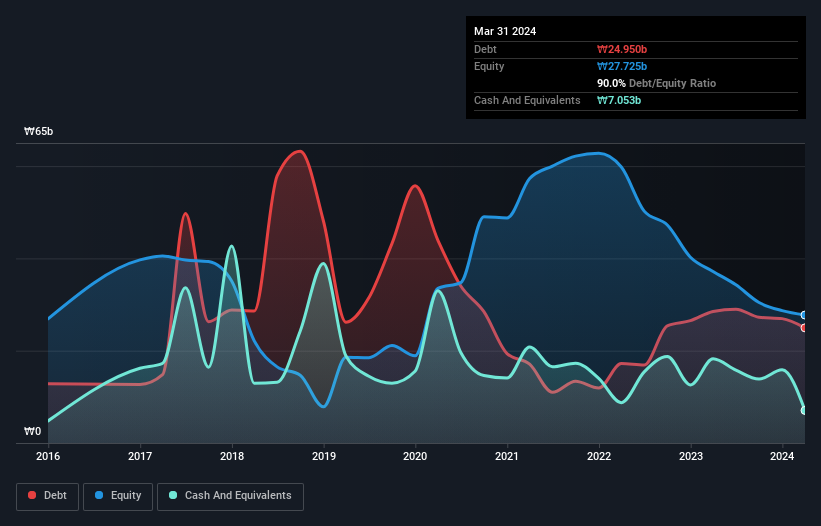The external fund manager backed by Berkshire Hathaway's Charlie Munger, Li Lu, makes no bones about it when he says 'The biggest investment risk is not the volatility of prices, but whether you will suffer a permanent loss of capital.' So it might be obvious that you need to consider debt, when you think about how risky any given stock is, because too much debt can sink a company. As with many other companies YoungWoo DSP Co.,Ltd (KOSDAQ:143540) makes use of debt. But is this debt a concern to shareholders?
Why Does Debt Bring Risk?
Debt is a tool to help businesses grow, but if a business is incapable of paying off its lenders, then it exists at their mercy. Ultimately, if the company can't fulfill its legal obligations to repay debt, shareholders could walk away with nothing. However, a more common (but still painful) scenario is that it has to raise new equity capital at a low price, thus permanently diluting shareholders. Having said that, the most common situation is where a company manages its debt reasonably well - and to its own advantage. When we examine debt levels, we first consider both cash and debt levels, together.
See our latest analysis for YoungWoo DSPLtd
What Is YoungWoo DSPLtd's Net Debt?
The image below, which you can click on for greater detail, shows that YoungWoo DSPLtd had debt of ₩25.0b at the end of March 2024, a reduction from ₩28.5b over a year. However, it does have ₩7.05b in cash offsetting this, leading to net debt of about ₩17.9b.

How Strong Is YoungWoo DSPLtd's Balance Sheet?
The latest balance sheet data shows that YoungWoo DSPLtd had liabilities of ₩51.7b due within a year, and liabilities of ₩1.54b falling due after that. Offsetting this, it had ₩7.05b in cash and ₩8.13b in receivables that were due within 12 months. So it has liabilities totalling ₩38.1b more than its cash and near-term receivables, combined.
This is a mountain of leverage relative to its market capitalization of ₩44.0b. Should its lenders demand that it shore up the balance sheet, shareholders would likely face severe dilution. The balance sheet is clearly the area to focus on when you are analysing debt. But it is YoungWoo DSPLtd's earnings that will influence how the balance sheet holds up in the future. So when considering debt, it's definitely worth looking at the earnings trend. Click here for an interactive snapshot.
In the last year YoungWoo DSPLtd wasn't profitable at an EBIT level, but managed to grow its revenue by 32%, to ₩50b. Shareholders probably have their fingers crossed that it can grow its way to profits.
Caveat Emptor
Despite the top line growth, YoungWoo DSPLtd still had an earnings before interest and tax (EBIT) loss over the last year. Indeed, it lost a very considerable ₩10b at the EBIT level. Considering that alongside the liabilities mentioned above does not give us much confidence that company should be using so much debt. So we think its balance sheet is a little strained, though not beyond repair. Another cause for caution is that is bled ₩8.6b in negative free cash flow over the last twelve months. So suffice it to say we consider the stock very risky. When analysing debt levels, the balance sheet is the obvious place to start. But ultimately, every company can contain risks that exist outside of the balance sheet. For example YoungWoo DSPLtd has 4 warning signs (and 3 which are potentially serious) we think you should know about.
If, after all that, you're more interested in a fast growing company with a rock-solid balance sheet, then check out our list of net cash growth stocks without delay.
New: Manage All Your Stock Portfolios in One Place
We've created the ultimate portfolio companion for stock investors, and it's free.
• Connect an unlimited number of Portfolios and see your total in one currency
• Be alerted to new Warning Signs or Risks via email or mobile
• Track the Fair Value of your stocks
Have feedback on this article? Concerned about the content? Get in touch with us directly. Alternatively, email editorial-team (at) simplywallst.com.
This article by Simply Wall St is general in nature. We provide commentary based on historical data and analyst forecasts only using an unbiased methodology and our articles are not intended to be financial advice. It does not constitute a recommendation to buy or sell any stock, and does not take account of your objectives, or your financial situation. We aim to bring you long-term focused analysis driven by fundamental data. Note that our analysis may not factor in the latest price-sensitive company announcements or qualitative material. Simply Wall St has no position in any stocks mentioned.
About KOSDAQ:A143540
YoungWoo DSPLtd
Engages in the development and manufacturing of display inspection equipment.
Excellent balance sheet and slightly overvalued.
Market Insights
Community Narratives



